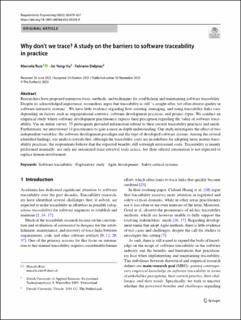Please use this identifier to cite or link to this item:
https://doi.org/10.21256/zhaw-30590| Publication type: | Article in scientific journal |
| Type of review: | Peer review (publication) |
| Title: | Why don’t we trace? : a study on the barriers to software traceability in practice |
| Authors: | Ruiz, Marcela Hu, Jin Yang Dalpiaz, Fabiano |
| et. al: | No |
| DOI: | 10.1007/s00766-023-00408-9 10.21256/zhaw-30590 |
| Published in: | Requirements Engineering |
| Volume(Issue): | 28 |
| Issue: | 4 |
| Page(s): | 619 |
| Pages to: | 637 |
| Issue Date: | 2023 |
| Publisher / Ed. Institution: | Springer |
| ISSN: | 0947-3602 1432-010X |
| Language: | English |
| Subjects: | Software traceability; Exploratory study; Agile development; Safety-critical systems |
| Subject (DDC): | 005: Computer programming, programs and data |
| Abstract: | Researchers have proposed numerous tools, methods, and techniques for establishing and maintaining software traceability. Despite its acknowledged importance, researchers argue that traceability is still “a sought-after, yet often elusive quality in software-intensive systems”. We have little evidence regarding how creating, managing, and using traceability links vary depending on factors such as organizational contexts, software development practices, and project types. We conduct an empirical study where software development practitioners express their perception regarding the value of software traceability. Via an online survey, 55 participants provided information related to their current traceability practices and needs. Furthermore, we interviewed 14 practitioners to gain a more in-depth understanding. Our study investigates the effect of two independent variables: the software development paradigm and the type of developed software system. Among the several identified findings, our analysis reveals that, although the traceability costs are an inhibitor for adopting more mature traceability practices, the respondents believe that the expected benefits still outweigh envisioned costs. Traceability is mainly performed manually: not only are automated trace retrieval tools scarce, but their offered automation is not expected to replace human involvement. |
| URI: | https://digitalcollection.zhaw.ch/handle/11475/30590 |
| Fulltext version: | Published version |
| License (according to publishing contract): | CC BY 4.0: Attribution 4.0 International |
| Departement: | School of Engineering |
| Organisational Unit: | Institute of Computer Science (InIT) |
| Appears in collections: | Publikationen School of Engineering |
Files in This Item:
| File | Description | Size | Format | |
|---|---|---|---|---|
| 2023_Ruiz-etal_Why-dont-we-trace_RequirementsEngineering.pdf | 2.56 MB | Adobe PDF |  View/Open |
Show full item record
Ruiz, M., Hu, J. Y., & Dalpiaz, F. (2023). Why don’t we trace? : a study on the barriers to software traceability in practice. Requirements Engineering, 28(4), 619–637. https://doi.org/10.1007/s00766-023-00408-9
Ruiz, M., Hu, J.Y. and Dalpiaz, F. (2023) ‘Why don’t we trace? : a study on the barriers to software traceability in practice’, Requirements Engineering, 28(4), pp. 619–637. Available at: https://doi.org/10.1007/s00766-023-00408-9.
M. Ruiz, J. Y. Hu, and F. Dalpiaz, “Why don’t we trace? : a study on the barriers to software traceability in practice,” Requirements Engineering, vol. 28, no. 4, pp. 619–637, 2023, doi: 10.1007/s00766-023-00408-9.
RUIZ, Marcela, Jin Yang HU und Fabiano DALPIAZ, 2023. Why don’t we trace? : a study on the barriers to software traceability in practice. Requirements Engineering. 2023. Bd. 28, Nr. 4, S. 619–637. DOI 10.1007/s00766-023-00408-9
Ruiz, Marcela, Jin Yang Hu, and Fabiano Dalpiaz. 2023. “Why Don’t We Trace? : A Study on the Barriers to Software Traceability in Practice.” Requirements Engineering 28 (4): 619–37. https://doi.org/10.1007/s00766-023-00408-9.
Ruiz, Marcela, et al. “Why Don’t We Trace? : A Study on the Barriers to Software Traceability in Practice.” Requirements Engineering, vol. 28, no. 4, 2023, pp. 619–37, https://doi.org/10.1007/s00766-023-00408-9.
Items in DSpace are protected by copyright, with all rights reserved, unless otherwise indicated.